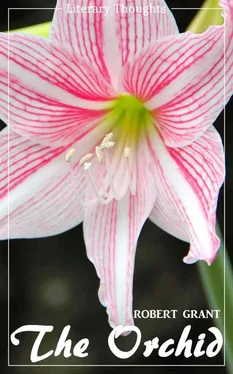The Orchid by Robert Grant
Literary Thoughts Edition presents
The Orchid,
by Robert Grant
Transscribed and Published by Jacson Keating (editor)
For more titles of the Literary Thoughts edition, visit our website: www.literarythoughts.com
All rights reserved. No part of this edition may be reproduced, stored in retrieval system, copied in any form or by any means, electronic, mechanical, photocopying, recording or otherwise transmitted without written permission from the publisher. You must not circulate this book in any format. For permission to reproduce any one part of this edition, contact us on our website: www.literarythoughts.com.
This edition is licensed for your personal enjoyment only. It may not be resold or given away to other people. If you would like to share this book with another person, please purchase an additional copy for each recipient. If you’re reading this book and did not purchase it, or it was not purchased for your use only, then please return to Amazon and purchase your own copy of the ISBN edition available below. Thank you for respecting the efforts of this edition.
It was generally recognized that Lydia Arnold's perceptions were quicker than those of most other people. She was alert in grasping the significance of what was said to her; her face clearly revealed this. She had the habit of deliberating just an instant before responding, which marked her thought; and when she spoke, her words had a succinct definiteness of their own. The quality of her voice arrested attention. The intonation was finished yet dry: finished in that it was well modulated; dry in that it was void of enthusiasm.
Yet Lydia was far from a grave person. She laughed readily and freely, but in a minor key, which was only in keeping with her other attributes of fastidiousness. Her mental acuteness and conversational poise were accounted for at Westfield—the town within the limits of which dwelt the colony of which she was a member—by the tradition that she had read everything, or, more accurately, that she had been permitted to read everything while still a school-girl.
Her mother, a beautiful, nervous invalid—one of those mysterious persons whose peculiarities are pigeon-holed in the memories of their immediate families—had died in Lydia's infancy. Her amiable but self-indulgent father had been too easy-going or too obtuse to follow the details of her home-training. He had taken refuge from qualms or perplexities by providing a governess, a well-equipped, matronly foreigner, from whom she acquired a correct French accent and composed deportment, both of which were now marks of distinction. Mlle. Demorest would have been the last woman to permit a jeune fille to browse unreservedly in a collection of miscellaneous French novels. But Lydia saw no reason why she should inform her preceptress that, having entered her father's library in search of "Ivanhoe" and the "Dutch Republic," she had gone there later to peruse the works of Flaubert, Octave Feuillet, and Guy de Maupassant. Why, indeed? For, to begin with, was she not an American girl, and free to do as she chose? And then again the evolution was gradual; she had reached this stage of culture by degrees. She read everything which the library contained—poetry, history, philosophy, fiction—and having exhausted these resources, she turned her attention outside, and became an omnivorous devourer of current literature.
Before her "coming-out" party she was familiar with all the "up-to-date" books, and had opinions on many problems, sexual and otherwise, though be it said she was an eminently proper young person in her language and behavior, and her knowingness, so far as appeared, was merely intellectual. Early in the day her father's scrutiny was forever dazzled by the assuring discovery that she was immersed in Scott. Mr. Arnold had been told by some of his contemporaries that the rising generation did not read Sir Walter, a heresy so damnable that when he found his daughter pale with interest over the sorrows of the "Bride of Lammermoor," he jumped to the conclusion that her literary taste was conservative, and gave no more thought to this feature of her education. Presently he did what he considered the essentially paternal thing—introduced her to the social world through the medium of a magnificent ball, which taxed his income though he had been preparing for it for a year or two. As one of a bevy of pretty, innocent-looking maidens in white tulle, Lydia attracted favorable comment from the outset by her piquant expression and stylish figure. But shortly after the close of her first season she was driven into retirement by her father's death, and when next she appeared on the horizon, sixteen months later, it was as a spirited follower of the hounds belonging to the Westfield Hunt Club.
On the crisp autumn day when this story opens, the members of that energetic body were eagerly discussing the interesting proposition whether or not Miss Lydia Arnold was going to accept Herbert Maxwell as a husband. This was the universal query, and the point had been agitated for the past six weeks with increasing curiosity. The hunting season was now nearing its close, and the lover was still setting a tremendous pace, but none of the closest feminine friends of the young woman in question appeared to have inside information. Even her bosom friend, Mrs. Walter Cole, as she joined the meet that morning, could only say in answer to inquiries that Lydia was mum as an oyster.
"I suppose the reflection that the offspring might resemble Grandma Maxwell tends to counteract the glamour of the four millions," remarked one of the group, Gerald Marcy, a middle-aged bachelor with a partiality for cynical sallies—also an ex-master of the hounds and one of the veterans of the colony. He was mounted on a solid roan hunter slightly but becomingly grizzled like himself. Thereupon he gave a twist to his mustache, as he was apt to do after uttering what he thought was a good thing. Most of the Westfield Hunt Club were clean-shaven young men who regarded a mustache as a hirsute superfluity. The nucleus of the club had been formed twenty years previous—in the late seventies—at which time it was the fashion to wear hair on the face, but of the small band of original members some had grown too stout or too shaky to hunt, most had families which forbade them to run the risk of breaking their necks, and others were dead.
Mrs. Cole's reply was uttered so that only Marcy heard it. Perhaps she feared to shock the smooth-shaven younger men, for, though she prided herself on her complete sophistication in regard to the world and its ways, one evidence of it was that she suited her conversation to the person with whom she was talking. There are points of view which a young matron can discuss with a middle-aged bachelor which might embarrass or be misinterpreted by less experienced males. So she caused her pony to bound a little apart before she said to Marcy, who followed her:
"I doubt very much if children of her own are included in Lydia's scheme of life."
Mrs. Cole was a bright-eyed, vivacious woman, who talked fast and cleverly. She was fond of making paradoxical remarks, and of defending her theses stoutly. She glanced sideways at her companion to observe the effect of this animadversion, then, bending, patted the neck of her palfrey caressingly. She was herself the mother of two chubby infants, and, out of deference to domestic claims, she no longer followed the hounds, but simply took a morning spin to the meets on a safe hack.
Marcy smiled appreciatively. As a man of the world he felt bound to do this, yet as a man of the world he felt shocked at the hypothesis. Race suicide was in his eyes a cardinal sin compared with which youthful indiscretions resulting from hot blood appeared trifling and normal. Besides, it was deliberate rebellion against the vested rights of man. This latter consideration gave the cue to his slightly dogged answer.
Читать дальше












